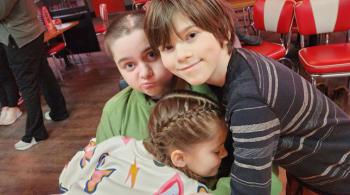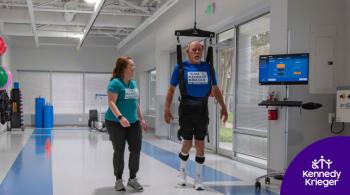On this month’s episode, we discuss feeding disorders in infants, toddlers, children and teens, how they are diagnosed and treated, and the difference between feeding disorders and eating disorders.
On this month's episode we speak with:
- Dr. Bradley Schlaggar, President and CEO, Kennedy Krieger Institute and host
- Dr. Peter Girolami, Program Director, Pediatric Feeding Disorders Program, Kennedy Krieger Institute
- Dr. Richard Katz, Mt. Washington Pediatric Hospital
You can also visit these links below:
- For parents: Feeding Matters
- For medical professionals: International Association for Pediatric Feeding and Swallowing
View Episode Transcription
Brad Schlaggar (BS): Welcome to Your Child's Brain, a podcast series produced by Kennedy Krieger Institute with assistance from WYPR. I'm Dr. Brad Schlaggar, President and CEO of Kennedy Krieger Institute in Baltimore. Today, I'm joined by doctors Richard Katz and Peter Girolami to discuss eating disorders in children. Dr. Katz is the Chief Medical Officer at Mount Washington Pediatric Hospital in Baltimore, Maryland and is an Associate Professor of Pediatrics at Johns Hopkins School of Medicine. Dr. Girolami leads the Pediatric Feeding Disorders Program at Kennedy Krieger Institute, and is an Assistant Professor of Psychiatry and Behavioral Sciences at Johns Hopkins as well. Welcome Richard and Peter. Let's start out with just basic concepts. When we talk about children having feeding issues what do we mean and how are these concerns in child development different than eating disorders? Peter I want you to take a crack at that one.
Peter Girolami (PG): Sure. A general definition of a feeding disorder is usually anything that includes any significant difficulty in consuming adequate nutrition by mouth. It can be due to a multiple factors including medical, developmental, psychosocial, environmental variables, leading to somehow adaptive feeding behavior. Typically associated with poor weight gain inadequate intake by mouth, meaning a tube fed or risk of malnutrition, whose limited variety of foods consumed. Which could lead to nutrition deficiency. It also leads to disruption in the family child interaction. You can have tantrums, excessive meal durations. Again, significantly difficulty advancing to normal and developmentally appropriate solid food textures. It is important to distinguish between something like eating disorders. We're not talking about something that deals with body image issues, worried about the shape, that's not what we're typically talking about.
BS: Richard, there's this concept or a construct called ARFID, avoidant, restrictive food intake disorder. What is that? Can you unpack that?
Richard Katz (RK): Well, the whole spectrum of feeding disorders in children is pretty broad and we've tried to come up with definitions that separate children with a significant problem from those who are picky eaters. The term ARFID really tries to socket to the issue and that we're trying to describe children who are really avoiding food and it's restrictive and it's significant. This is very different than the child who won't eat broccoli or the typical toddler who only eat a few things at a meal. It's a complex term because it's a complex problem. There's a newer term that's being used and it's now being more widely disseminated and just pediatric feeding disorder, which broadens the category but doesn't really describe the problems as we as professional see it. As I'm fond of saying, everybody's an expert in feeding, including grandparents. But truly there are only a few people who are really experts in managing these complex problems, and ARFID requires a very unique set of treatments.
BS: Richard, sticking with you, we heard a bit about onset of feeding problems in infancy. What are some of the causes of these very early feeding problems?
RK: As in many things in medicine, we can only speculate about things that happened in babies. They clearly can't tell us what's going on, but we take care of a lot of premature infants who have been incubated for a long time when they're awake. I tried to describe to parents like, imagine what a spoon would look like if that's coming at you versus a tube coming at you when you're awake. There's a natural tendency to avoid that abnormal or painful stimulus. But there are other things as well and we really don't always know, but lot of children have gastroesophageal reflux, bringing stomach contents back up into the esophagus or vomiting and bringing up acid and that can injure the esophagus, cause discomfort. Then what do you do if you have something uncomfortable you try to avoid that. We think that that may be one reason why children have food restriction when they've been reflexing. But there's also a whole host of anatomic and developmental issues that these children have too, lots of children who have complex medical problems unrelated to having surgery in the GI tract and things like that tend to avoid noxious stimuli, which they think food is when they've been sick for a long time.
BS: Peter picking up on that. These behaviors that seem to be in response to a threat or sense of imminent discomfort. Can you talk more about what are some of the other reasons that a child might develop a feeding problem?
PG: Yes. As Richard touched upon, children at a young age can be exposed to painful and discomfort feeding experiences which can lead to some form of condition diversion. If again, if you put yourself in the shoes of every time you try and eat you threw up where it was uncomfortable, you probably would want to avoid that, leading to a lot of other issues. As children avoid food, they are often missing through very crucial developmental stages. We take for granted that a child is six months or a year is being exposed to different types and tastes and textures. Imagine not having that occur until you're three or four years of age, you're missing that experience. Not just being exposed to these flavors and these new things, these colors,, and you're also not using your oral motor skills. Making it more difficult for you to actually consume these foods. Then you also have that interaction with the parents. You have parents who might be very nervous or cautious because their children had a medical issue. Kids who are throwing up or pushing food away, parents who are often quick to say okay, that that's right here. Let me provide you with your preferred food. Starting this process of, is it medical, is it developmental, is it behavioral, takes its own genesis and moves into more significant issues.
BS: I think just continuing with you Peter, there's this concept of picky eater versus feeding disorder. How do you draw the line and what distinguishes between just a picky eater and somebody who's going on to have a feeding disorder.
PG: We don't expect everybody to like everything. We don't like all foods. We have preferences and actually it's normal to not want a particular food, not wanting all the green vegetables at a young age is not something that you'd be too worried about providing that you have a number of foods and other categories. There's a term called neophobia, where it's normal to be nervous about trying new things. It's evolutionary. But then you start going into more moderate selectivity, where you start to see a very selective range of foods. But at that point they'll still be within these foods, maybe there's something from each food group. But they'll eat in most situations and most venues. When you start to see severe selectivity, you're talking about brands specific. We have kids that will only eat a certain type of French fry or chicken nugget. They're not eating fruits or vegetables at all. They're not going to birthday parties because they're worried of sleepovers because they're concerned about what's going to be presented there to eat. Then this impacts the family if you'll have severe problem behavior including meltdowns during meals and tantrums, so that's when you start to gravitate there. You can start one way, but again, it could eventually lead to something more significant.
BS: Richard, both of you lead feeding disorder of programs at your institutions. Can you talk a bit about the approach to diagnosis and maybe even touch on the composition of the team approach that you both take in your programs.
RK: One of the things that I've learned in Baltimore and by the way, in Baltimore we're very fortunate to have two well established teams that know what to do. I just want to give us a little bit of a plug in that many cities don't even have one program. Many very large cities, many very large children's hospitals don't have these programs. These require a great deal of effort, a great deal of ability to have teams that work together, which is to me the hallmark of managing these problems. This is not a single discipline problem. This is not just a medical problem. This is not just a gastroenterologist taking care of this problem. This is not just a psychologists taking care of this problem. Both programs have the same accompaniment of people. We have physicians involved, we have psychologists involved. We have occupational therapists involved, speech pathologists involved, dietitians involved, social workers involved, as part of the core team to try to fair it out the complexity of the issue. As Peter said, this is not just picky eating, this is not just losing broccoli. This is a very significant problem causing disorder of not only the physical problem but the emotional problems of the family. It requires everybody to look at this from the ability to arrange how a child sits in a chair, for the appropriate posture for eating, to how is behavior at mealtime. To whether or not is reflexing or is in pain. Then also how this really impacts the child's nutrition, and finally, how important it is to the families social well being. We really truly believe that this is an interdisciplinary treatment problem.
BS: You mentioned earlier that there's a lot of sense of self expertise in picky eating and feeding issues. Yet you've just described this multi disciplinary team of highly trained professionals in different domains that work together. Richard, talk a bit about the advice that parents get from family, other members of the family, maybe their own parents or their friends, and how that works or can sometimes be a challenge as parents are navigating a child with a potential feeding disorder.
RK: That's a really important issue. I can tell you that almost every patient I see the last five minutes, I talked to them about who's an expert in feeding and who's not. Everybody thinks that everyone eats that we know of or I should say, everyone assumes everyone eats. But everyone then thinks they're an expert in eating and so young parents in particular feel like their parents are better experts than they are, the grandparents definitely feel like the expert, and so everybody is got an opinion. We also know that their opinions can often be dead wrong. I caution the families to realize that this is a significant problem, you need a significant group of professionals to do this. I will just jump ahead one point here that I talk to families that this is a disability like other disabilities. We don't assume that every child walks. We don't assume that every child runs, or that every child hears, that every child sees. Why do we not have the same assumption about every child eating? Eating is an incredibly complex physiologic process. It requires protecting your airway, chewing, swallowing, all kinds of things. It's a wonder that 99 percent of the time we do well. I tell these things to the family to know that they're not alone and this is a serious problem. If you have to have me talk to the grandparents, I'm more than happy to.
BS: Peter, you want to add to that?
PG: Well, I will say as a side note, when I first got the position here at Kennedy Krieger, I told my grandmother, who was very excited, but she asked me what do I do the rest of the day. I said, "What do you mean, what do I do the rest of the day? " She's all, "Who doesn't eat." It was a very good example of that in terms of the view of people in other situations where they don't understand that this a significant.
BS: Well, we've talked about the composition of this multi-disciplinary team and it's importance for diagnosis, understanding exactly what we're dealing with with each individual child. The next question is how are feeding disorders treated? What is the approach? Peter, maybe we could start with you.
PG: Like Richard touched upon, the most important part is finding out the why. The kids have multiple various factors of why they are not eating. If there's a medical issue, that medical issue needs to be treated because if you're not treating that issue, you're trying to get someone to eat or try to work on oral motor skills and they might be in discomfort. The other part is that also can they eat? What's their ability? Our goal is really to reach the children's potential. Again, we work with these folks, try to get them as far along the process as they can because as we just discussed, how important eating is socially and culturally, just being able to sit at the table. That's where a lot of families have their opportunities to get to share their days with each other. We take that approach as an interdisciplinary team to try to be detectives and try to fair it out all the different reasons that could be going on there. A good example is sometimes when we work with kids who have never eaten before, so we don't know until they're starting to take food in their mouth. Are they sick? We have potential of swelling issues that can't be diagnosed until you're getting them to try some foods. You don't know until you try different textures, is their ability there to take those textures. Then also to the refusal part, the unwillingness to try the foods. There's so many kids that have not tried things. They say they don't like it or they can't do it, once they start eating, Richard and I know this very well, they sometimes take off and they actually really enjoy the food. It's just they've never tried it. We try to tackle the medical part of it by using the current medical technology and the knowledge we have, the oral motor piece. Speech-language and occupational therapists are experts in working on oral motor skills. It's almost like rehab for your mouth. This makes it easier for the child to chew something up or to manage the food to avoid coughing and gagging. Then again, that behavioral piece is that exposing them gradually to these different foods if there's fear involved to show them that you're okay, the food goes down and there's nothing happens and you start to build up that momentum. These things all work together. But we also take into account the family dynamic. Because again, do the family have the resources to do the things that we're asking them to do and also to do the family have the resource to eat the foods that we're asking them to present to their child? It really is a comprehensive approach to take care of things because of all the different variables involved.
BS: Richard, maybe pick up on the approach that you take at Mount Washington, but also what happens if we don't succeed in addressing the feeding disorder adequately? What happens to that child?
RK: That's a really important question. Would be because there is no quick solution to most of these issues. There are a few circumstances where relatively short-term psychology sessions will be able to help a child who has hurt themselves with swallowing and is avoiding food. A short-term period with a psychologist seems to work, but most of these children do need a gradual approach to re-introduction or introduction of feeding with the whole team and as Peter said, trying to understand if there's a medical oral motor issue or a behavioral issue or some of each of those things. We know that children can survive on tube feeds. It's really the hallmark of what we have done in pediatric GI in the last 30 years in making sure that children do get nutrition. But living with a tube is not the way to go for most people. We know that we really tried to wean these children off of tube feeds to prevent them from becoming dependent on tube feeds, but we also know that if feeding disorders aren't treated early on, that can lead to permanent feeding disorders.
PG: The other part is that sometimes families are getting advice that this will remedy itself over time, just keep doing what you're doing. Years can go by, we typically start to see kids when they start to enter going to school because all of a sudden, boy now this eating problem, the school can't handle it or you going social situations. It could be very difficult to not work on those things. There are just lots of critical windows of time where these skills can be developed, but when you're talking about 10,11,12 and you haven't worked on this yet it could be more difficult because the children are more ingrained in that process and what they're eating and they don't know anything else there. I think an assessment in an early period of time is very important because you can really get it before it becomes a bigger thing.
BS: Can each of you talk about where are the new treatments or research or discoveries that are on the horizon, where's the field heading, Richard?
RK: Well, it's heading where it's been for a while that the establishment of interdisciplinary teams, and that needs to be broadened around the country. It's unfortunate that it's so difficult for some people to access those teams. We really think that that's what our societies are trying to do is to develop interdisciplinary teams to be able to help children significantly. I think as we begin to understand more about the GI issues and that is more complex than just a little bit of reflux, I think that's where a lot of that has been going to go and better diagnostics in terms of, is somebody hurting? Is their esophagus uncomfortable? Do they have too much acid production? I think we know that for a lot of children, but I think the technology for small babies has just not been as good as it could be. I think that's one aspect of it and I'm sure Peter has ideas about the behavioral approaches.
PG: Yeah, one great thing that over the years is that there's now a lot of empirically supported research on the effective treatments for these kinds of feeding issues. There's groups design and also single-subject design with a variety of different therapeutic techniques that are now supported and they're being used. There are resources out there to access these approaches that you could try out. The key is though, again, you want to make sure that you're working with someone who's experienced in feeding disorders, because, again, making sure that you're covering all those variables. Applying an intervention that's not a good match for a child is not going to be effective. Pairing these interventions with the right family and the child is extremely important, but there are so many more out there and both of our programs are on the forefront of disseminating this information, that there really is a much better situation than we were years ago.
BS: Let's talk about how parents can learn more. Are there good resources available on the Internet? Are their scientific societies that focus on dissemination of information? What can you say to that point?
RK: I just want to caution parents. There are a lot of books out about this and there's lots of web information about children with feeding disorders. There's lots of apparent quick fixed type solutions. What we really have to know is that one procedure doesn't fix all. Parents have to be very careful about what road they're going down and who they're following. We know that there are lots of people who work with single-discipline programs that pigeonholed children into a certain pathway and we know that that's really not effective. I would caution parents to read as much as they can, talk to as many people as they can about this, professionals about this, and there are two societies that are available that are producing information. One is more parent family-directed, and one is much more scientific academic directed, but there's good information from those societies out and available to people.
BS: Peter.
PG: Yeah, I would agree. I think you've got to be very careful, the one size fits all and I think you really have to look at patterns. If you are trying to intervene on a problem related to feeding and you have to watch, are things getting better, worse, or the same, and there's sometimes easy ways to do that. You can just look at how long is your meal taking to complete. If that's just a simple timer it'll notice that the meal is getting longer or shorter can give you a nice indicator. If you're noticing those things aren't working, you want to abort the mission and you don't want to keep going in that direction and reach out to a provider. Any number of pediatricians may not have a feeding experience but they can often send you to a feeding team or give you potential some resources that are available for helping this situation.
RK: I've been a general pediatrician and I know what the general pediatricians have to deal with, seeing four to six children an hour. They see a lot of toddlers. They see a lot of parents who are concerned about their children's eating. They don't always know from what parents are telling them that this is a severe problem. I would say to parents that if you're chasing the child around the house to feed them, if you have to feed them in the bathtub, if you're giving them one single food every day, you've really got to say that specifically to your pediatrician so they can help you and then step in and offer referral to the right place. It's really critical that parents have to be diligent about this, telling this to their pediatricians. I know what those days were like and seeing so many children an hour and everybody has to concern about their children's health and well-being, but sometimes it's really far beyond what a normally acceptable differences.
BS: Really important point, Richard. I just want to underscore how challenging it is for that general pediatrician, for the family practice doctor, for that frontline provider who is seeing a lot of patients in a brief period of time, that it's really important for parents to be explicit, as you say, to make clear that the challenges that they're facing, so that recognition of a potential feeding disorder is made promptly. You mentioned Richard, that there's a couple of societies, one more practitioner-oriented, one more parent-oriented. Maybe, let's just say them and we could potentially provide the information on the podcast website as well.
RK: The parent and family societies is Feeding Matters based in Arizona and the professional society is, it doesn't have a very catchy name, but it's International Association of Pediatric Feeding and Swallowing. Both have websites and there's a lot of information on both of them.
BS: That's great. Peter, Richard, [MUSIC] thank you so much for a rich conversation about the important issue of feeding disorders. Greatly appreciate it. You've been listening to Your Child's Brain. Your Child's Brain is produced by Kennedy Krieger Institute with assistance from WYPR and producer Spencer Bryan. Please join us next time as we examine the mysteries of your child's brain. [MUSIC]















